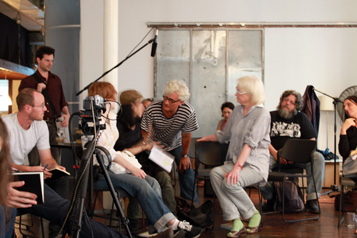CONNECTIVE MUTATIONS
Autonomy & Subjectivation in the Coming Century
 Franco Berardi (aka Bifo) is an Italian philosopher, political activist, writer, and media theorist, who is currently Professor of Social History of Communication at the Accademia di Belle Arti of Milan. Bifo was a member of the Italian group Potere Operaio (Worker Power). After Potere Operaio broke up into a number of groups between 1973 and 1974, Bifo joined Autonomia's “cultural” wing, which experimented with media and cultural production. In 1976, he was one the founders of Radio Alice in Bologna, the first Italian pirate radio station, which chronicled the insurrectional events of 1977 in the city and was shut down by the authorities. Between 1976 and 1981, Berardi was also one of the editors of the magazine “A/traverso,” which became the paper of the Bologna creative movement. For Bifo and other activists of the “creative" Autonomia, the use of media enabled the constitution of a zone of linguistic self-organization in alliance with other areas of auto-organization, such as the factory or the University, and especially with non-institutional zones of experimentation with ways of life.
Franco Berardi (aka Bifo) is an Italian philosopher, political activist, writer, and media theorist, who is currently Professor of Social History of Communication at the Accademia di Belle Arti of Milan. Bifo was a member of the Italian group Potere Operaio (Worker Power). After Potere Operaio broke up into a number of groups between 1973 and 1974, Bifo joined Autonomia's “cultural” wing, which experimented with media and cultural production. In 1976, he was one the founders of Radio Alice in Bologna, the first Italian pirate radio station, which chronicled the insurrectional events of 1977 in the city and was shut down by the authorities. Between 1976 and 1981, Berardi was also one of the editors of the magazine “A/traverso,” which became the paper of the Bologna creative movement. For Bifo and other activists of the “creative" Autonomia, the use of media enabled the constitution of a zone of linguistic self-organization in alliance with other areas of auto-organization, such as the factory or the University, and especially with non-institutional zones of experimentation with ways of life. As a result of the repression of the autonomist movement in Italy in the late seventies, Bifo fled to Paris, where he worked with Félix Guattari in the field of schizoanalysis. During this time he wrote for the Chimeres journal in Paris, the Semiotext[e] journal in New York, and the Musica 80 journal in Milan. Bifo has authored numerous books, including Cyberpunk, The Panther and the Rhizome, Politics of Mutation, Philosophy and Politics in the Twilight of Modernity, and The Factory of Unhappiness.
He recently authored the Post-Futurist Manifesto, available at:
http://www.generation-online.org/p/fp_bifo5.htm
Since the 1970’s Bifo has focused on the changing nature of capitalism and its use of communication technology and culture within a new regime of production. Bifo’s political practice intersects with the theoretical and conceptual terrain of Guattari’s writings to rethink individual and collective processes of subjectivation along with the material and semiotic transformations of the mediascape. Like other Italian autonomists such as Christian Marazzi, Paolo Virno, and Antonio Negri, Bifo emphasizes the growing autonomy of immaterial workers from waged labor, and the intimate connection between the linguistic and affective qualities of immaterial labor and the booms and busts of semiocapitalism.